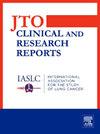程序性死亡配体 1 高表达的非小细胞肺癌患者的种系人类白细胞抗原状态与免疫疗法诱发的肺炎和治疗反应有关
IF 3
Q2 ONCOLOGY
引用次数: 0
摘要
方法我们评估了42例接受pembrolizumab免疫治疗的程序性死亡配体1表达率达到或超过50%的患者的种系和现有肿瘤样本的HLA基因型。结果 观察发现,种系HLA-C同源性和HLA-DRB1∗13表达与较差的无进展生存期和治疗反应有关。重要的是,在我们的队列中,所有出现肺炎的患者(7/7)都表达了HLA-DPB1∗02等位基因,表达该等位基因的患者肺炎发生率为31.8%(7/22例),而未表达该等位基因的患者肺炎发生率为0%(0/20例)(P = 0.009)。对 15 名患者的肿瘤样本进行的调查显示,40% 的患者(6/15)的 HLA I 类位点存在一定程度的 HLA 缺失,不同治疗反应的患者在肿瘤突变负荷方面没有发现显著差异。结论综上所述,本研究评估了高表达程序性死亡配体1的NSCLC患者种系和肿瘤样本中HLA状态的影响,在表达HLA-DPB1∗02等位基因的患者中,免疫治疗诱导的肺炎发生率较高,这可能建议对这一患者亚群进行常规HLA分型和更密切的监测。本文章由计算机程序翻译,如有差异,请以英文原文为准。
Germline Human Leukocyte Antigen Status is Associated With Immunotherapy-Induced Pneumonitis and Treatment Response in Patients With Non–Small Cell Lung Cancer With High Programmed Death-Ligand 1 Expression
Introduction
The germline human leukocyte antigen (HLA) status has been found to be associated with immunotherapy outcomes in patients with NSCLC, but its correlation to immunotherapy-induced pneumonitis and prognostic impact in the Asian population remains largely unknown.
Methods
We evaluated the HLA genotype of the germline and available tumor samples in 42 patients with programmed death-ligand 1 expression of 50% or higher undergoing pembrolizumab immunotherapy. The HLA allele expression was correlated with tumor response, disease survival, and the occurrence of pneumonitis.
Results
It was observed that the germline HLA-C homozygosity and HLA-DRB1∗13 expression were related to a worse progression-free survival and treatment response. Importantly, all patients (7/7 patients) who developed pneumonitis in our cohort expressed the HLA-DPB1∗02 allele, and the incidence of pneumonitis was 31.8% (7/22 patients) in patients expressing this allele compared with 0% (0/20 patients) in those without this allele (p = 0.009). Investigation of the tumor samples from 15 patients revealed some degree of HLA loss in the HLA class I loci in 40% (6/15) of patients, and no significant difference in tumor mutation burden was found among patients with different treatment responses.
Conclusion
Taken together, this study evaluated the impact of HLA status in both germline and tumor samples in patients with NSCLC with high programmed death-ligand 1 expression, and the high incidence of immunotherapy-induced pneumonitis in patients expressing the HLA-DPB1∗02 allele may suggest a routine HLA typing and closer monitoring in this patient subset.
求助全文
通过发布文献求助,成功后即可免费获取论文全文。
去求助
来源期刊

JTO Clinical and Research Reports
Medicine-Oncology
CiteScore
4.20
自引率
0.00%
发文量
145
审稿时长
19 weeks
 求助内容:
求助内容: 应助结果提醒方式:
应助结果提醒方式:


